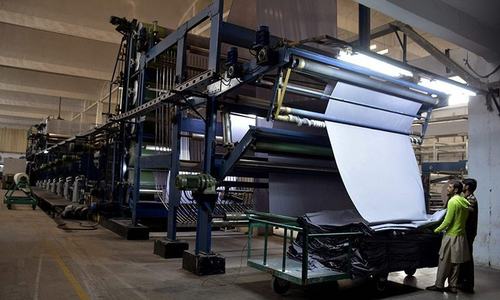ISLAMABAD: The government has unveiled the new Small and Medium Enterprises (SME) Policy 2021-25, with focus on promoting around five million businesses through facilitation in registration, streamlining of taxes, access to credit and provision of land.
Overall, the policy is aimed at providing facilities and incentives to the SME sector, which contributes around 40 per cent to the GDP and accounts for 25pc of all exports.
Unveiling the policy on Wednesday, Minister for Industries and Production Khusro Bakhtiar said that for the first time in Pakistan an all-inclusive SME policy had been launched, which had divided these enterprises into three sectors, including low risk, medium risk, and high risk.
The government has decided to establish an SME fund amounting to Rs30 billion, and restructure Small and Medium Enterprise Development Authority to make it a more private sector–driven entity.
Rs30bn earmarked to develop small and medium enterprises
“This policy addresses all the issues hindering SME sector’s development in the country, such as unnecessary inspection that only adds to the cost of doing business,” he said while addressing a news conference.
The new SME policy has been approved by the federal cabinet and it is expected to be notified by the Ministry of Industries and Production in the coming days.
Flanked by Information Minister Fawad Chaudhry, Mr Bakhtiar added that even before the approval of the SME policy by the cabinet, key initiatives on SMEs, including access to credit, lowered tax regime and regulatory simplifications, had been launched.
Mr Bakhtiar said there were a total of 5.2m SMEs in Pakistan, which were the backbone of the economy as they represented over 99pc of the country’s total business and employing over 78pc of the non-agriculture labour force.
He said the provinces had also approved the “Zero Time to Start-up Policy”, aimed at extending facilitation and incentives to promote the growth of small and medium enterprises.
Under the policy, a no-objection certificate (NOC) is not required for start-ups and expansion to low-risk businesses, including the service sector, transport, wholesale, etc.
The medium-risk SMEs — including the light engineering, leather, auto parts, cutlery, sports goods, etc. — will be provided with the NOC within 30 days, and if the certificate is not issued within that time by the relevant authorities, it is deemed that the NOC has been issued.
“And there is a limited segment such as those dealing in explosives, fire equipment, boilers, chemicals, etc. that are in the high-risk businesses category,” the minister said.
Another facility under the policy is the abolishing of the government’s regulatory interference, including the “Inspector-Less Inspection Regime”.
“To eliminate harassments and bribes by the inspectors, a self-declaration by SMEs on regulatory compliance and an e-inspection portal to monitor and self-verification of on-site inspections visits have been introduced,” Mr Bakhtiar said, adding: “We need to look into the reduction of over-regulations of the industries, mainly the SMEs, and the matter is under discussion with the provinces.”
The new policy also offers tax incentives to SMEs in the manufacturing sector by reducing the turnover tax rate from 1.25pc to 0.25pc for enterprises having an annual turnover below Rs100m, while the tax rate has been fixed at 0.5pc for units with a turnover between Rs100m and Rs250m.
Besides, the ‘Aasan Finance Scheme’ is being introduced under the new policy to ensure access of capital to the industries, Mr Bakhtiar said. Loans up to Rs10m with lower markup rates of 9pc will be provided without any collateral for setting up 30,000 new businesses. Also, Rs23.5bn has been allocated to share up to 60pc financial loss borne by SMEs.
Venture capital regulations will be reviewed to support the growth of this sector for providing equity finance to start-up SMEs, including those in the IT sector.
Under the policy, 4,200 acres have been allocated to develop 19,500 plots at the dedicated industrial infrastructure for SMEs. Market access regulations are being revised to allow greater SME participation in the public sector procurement of goods and services. In addition, the Trade Development Authority of Pakistan will ensure increased SME participation in international trade fairs and exhibitions.
The SME policy has a special focus on supporting women entrepreneurship by attaining greater access to finance, awareness and training, while an SME registration portal has been launched to provide one-point access to all incentives available to these enterprises. Women-led enterprises have been given a 25pc rebate in tax.
The last SME policy was announced in 2007, but it failed to facilitate the sector’s growth.
Published in Dawn, December 16th, 2021














































